Vinphonic
10-03-2017, 03:15 PM
The Lecacy of Japanese Composers
Kosuke Yamashita
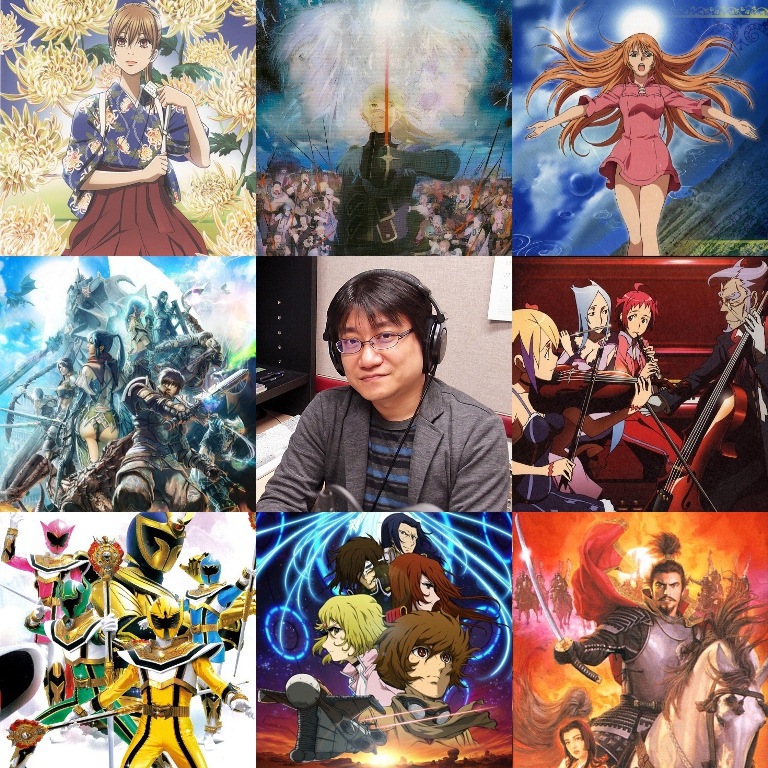
Kosuke Yamashita embodies the very principle of any great composer: Composition = Orchestration. The man is not even close to the age when Williams wrote the first STAR WARS and already demonstrates a genius at both disciplines that equals the Hollywood greats in their prime. Not to mention his melodic genius that produces killer theme after killer theme. Yamashita is also no stranger to collaborations. His genius at orchestration made him a prime candidate for Hisaishi to arrange his music for various occasions. To this day he is a sought after arranger for many orchestral projects and his reputations is equal to that of a great composer (lucky that he IS one as well). Considering his age that’s an enormous accomplishment. An interesting and rather saddening fact is that (like Jerry) he wrote his most accomplished work for obscurities (from anime to games) and only few people are even exposed to his genius. Still, he managed a nice successful career regardless, working in all fields of Japanese media and beyond. He currently works for a prestigious project that will hopefully put him on the radar of many directors and producers currently unaware of his gifts.
So let's dig in:
Part I – Universe (SciFi scores)

Yamashita wrote one of the best SciFi scores for the Anime medium with Glass Fleet, a highly energetic and thematic classical score that excels on all fronts. Almost every note is pitch-perfect. His mastery of orchestration at the age of 32 is just astounding. It’s an instant classic and certainly among the very best scores the anime medium has to offer: From the heroic theme A boldly soaring in “Michel” or the dramatic Theme B galloping in “Cleo of Swift Wind” to the playful and majestic “To the Flag of Freedom” and the innocent and romantic “Friendship”, it’s a great score and an incredible showcase of Yamashita’s genius.
Xenosaga: The Animation was in many ways a precursor to Glass Fleet. But this beast is much more “Hollywood” and rhythmic than the more classical Glass Fleet. It’s a perfect throwback to the glorious days of Hollywood ScFi. Yamashita also incorporates quite a bit of the game’s soundworld, meaning a healthy dose of synth pads and vocals. He also draws from his experience with Nobunaga’s Ambition and quite a few familiar moments appear.
Yamashita wrote perhaps the most mesmerizing epilogue for an Anime ever with Ozuma. He employs a full choir for the final reprise of his Main Theme and it evokes various kinds of overwhelming emotions, almost Mahler-esque. “Emergency sensor Barados” is a fantastic action show-off piece that brilliantly incorporates the Main Theme, with various orchestration stunts such as the use of organ. There’s a lot of chilling atmosphere in this one, accomplished by clever use of synth pads, organ, bells and esoteric flute. If you love experimental Jerry you will love “Ozuma and Arika”.
Dragonaut: A typical Japanese case of a ridiculous and silly SciFi-Anime getting a proper orchestral score. More contemporary than his other SciFi classics: Beats, E-Guitar and pounding synth bass, but all interwoven into a great orchestral voyage with a few peaks into the classical realm. Great usage of Leitmotif and thematic development. After Tanaka, here’s another composer who you can look up when you want to learn how to use an E-Guitar in an orchestral context AND what you can accomplish with a tiny ensemble.
Part II – Determination (Sport and Adventure scores)

Chihayafuru is perhaps his most uplifting and inspiring score. It has a fantastic theme, one of the very best he has written. It’s also used A LOT in the score. Thankfully Yamashita excels at Leitmotif writing so no problems there. For this sports drama he goes to various places, a full blown orchestral march, a beautiful romantic Love Theme and an incredible happy, bouncy and playful theme for the second season. A fair bit of synth pads and ethnic instruments are also present. But it’s really the drum kit that kicks things up a notch: One of the greatest examples of a drum kit easily doing almost the whole orchestral percussion part if you know what you are doing.
Another theme to die for is Soredemo Sekai wa Utsukushii (The World is Still Beautiful). A beautiful fantasy score that while it lacks proper action thanks to inadequate budget, still impresses thanks to its gorgeous theme and classical charm: beautiful waltzes, romantic love theme and serene song.
Shion no Ou ~ The Flowers of Hard Blood is a typical Japanese scoring practice. A seemingly mundane or ridiculous thing is scored like an epic film. You would not think it’s just music for a sports show. In this case it’s shogi. But Yamashita scores it like a great psychological love drama. Only the few uses of synth and beats give it away. Great score.
Yamashita ventures a little into Sentai territory with Digimon Xros Wars but not without a fair share of Hollywood pieces and yet another great theme. Quite a lot of delicious sax as well. Shame about the tiny budget though.
Part III – Ambition (Game scores)

Yamashita really started his career and became famous with Nobunaga’s Ambition, taking over after Yoko Kanno left. He pretty much became the series main composer with seven game score and an orchestra concert under his belt. They are all great and beautiful film scores and Yamashita pretty much scored all games like Hollywood movies, using almost every instrument ever used for film. They are very much uplifting and inspiring in nature, which makes sense considering you are encouraged to conquer the lands of Japan. My favorites are Nr. 4, for which he worked with the Czech Philharmonic, and Nr.7, again recorded with a big ensemble and some truly glorious moments that serve their purpose as a farewell from Yamashita to the franchise. Ever since the series stayed true to Yamashita’s legacy and stays Hollywood focused.
Part IV – Journey (Symphonic scores and collaborations)

Reign of Revolution is yet another masterpiece from Yamashita (for an obscure game) and another of the rare cases where he got his hands on a proper symphonic ensemble and choir. What amazing results! An epic fantasy adventure that would work just fine as a symphonic album. He also ventures occasionally into his Nobunaga soundworld. I’ve also included his Overture piece for good measure and because of similar spirit.
For Call of Chaos he almost lets the magic happen twice. Although not as substantial or cohesive as R2, it has many sublime moments and is more classical. Again working with a big ensemble.
On to his collaborations:
For Yamato Resurrection he did some great arrangements of Miyagawa’s iconic score. Guest appearance by Mahler. It’s all a precursor to the upcoming Yamato 2202, hopefully another Glass Fleet.
For the symphonic game album Orchestral SaGa –Legend of Music- he arranged the works of four composers to a grand symphonic journey. His orchestration skills and style shine so brilliantly here, that it might as well be his own symphonic work. He was also blessed with another symphonic ensemble: The FILMharmonic Orchestra of Prague. A mesmerizing work from start to finish. Scans by Leatherhead.
Hayabusa -The Long Voyage home- is for all intends and purposes a beautiful Hollywood SciFi score. A collaboration project of Nobuyuki Tsujii and Kosuke Yamashita where Yamashita did most of the heavy lifting. Also a sublime moment of Soprano Vocals.
Another collaboration where Yamashita overshadows his partner is Glass no Kamen. He arranged the heavy meat of Tamiya Terashima’s music into a beautiful, lyrical, majestic and romantic symphonic body. There’s just so much magic and spark in this one you have to hope that these two will collaborate again sometime in the future.
Casting Blossoms to the Sky is another beautiful and lyrical score and a special case where Yamashita arranged music from and composed together with the master (Hisaishi). There’s some stunningly beautiful moments in this gem.
Indivual pieces: For various game projects he arranged music that is not yet officially released but a few pieces are out there and they are just marvelous. Don’t miss the next SaGa: Scarlet Grace because Yamashita is arranging with a symphonic ensemble. For Konichiwa Anne he composed and arranged an insanely cute and heartwarming opening and his Wriggling Waltz is just stunning concert work.
Part V – Action (Tokusatsu scores)
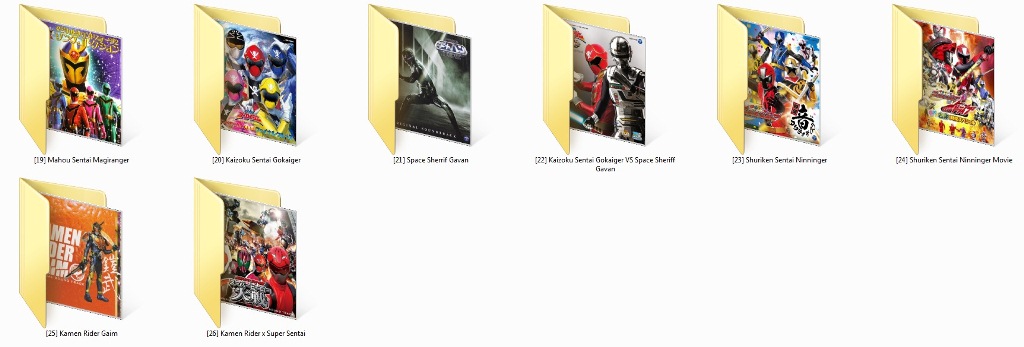
Another brilliant side of Yamashita is his gift for energetic orchestral action with guitars, drum kits and synth pads. Nowhere shines this side brighter than in the scores he wrote for Super Sentai. Whether orchestral rides like Magiranger, proper symphonic adventures like Gokaiger or ridiculous fun like Ninninger, it’s all spectacle: Killer themes, upbeat action and glorious fanfares. For the numerous movie versions I combined certain scores I was not exactly happy with standalone. Space Sheriff Gavan (and Kamen Rider X Super Sentai if I remember correctly) is by Tangotreats.
Part VI – Romance (J-Drama scores)

You cannot exactly overcome the ideoms of the Japanese drama sound but within that soundworld Yamashita crafted some amazing scores.
Renai Neet is a lovely romantic score with another theme to die for, often played on soprano sax. Delightful marches, enchanting Jazz and beautiful romantic moments make this a joy to listen to. FLAC by nextday.
He wrote a similar delicate and beautiful score for Papa to Musume no Nanokakan (Father & Daughter). But I feel this one is even stronger in the romantic department and a bit more mature. There’s some genuine moments of grandeur as well.
Hana Yori Dango: He wrote some really great themes for this one, “Returns” in particular. More Hollywood than the usual drama and some sublime moments.
For Her husband he wrote perhaps his most joyful theme, with genius trumpet counterpoint. Runaway feels more like a Hollywood thriller and for Yamato Nadeshiko Shinchi Henge (The Wallflower) he goes nuts with orchestral grandour, pompous Jazz, frentic rock and pounding beats. Yukan Club finishes things with a mix of classic, baroque, Jazz and Rock.
Composer Profile: Kosuke Yamashita
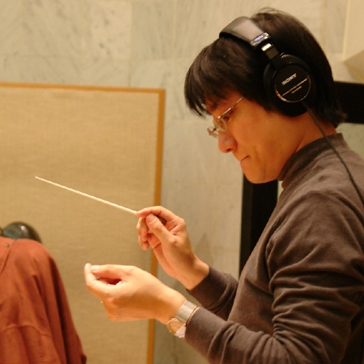
Trademark: Orchestral Acrobat, Magic Drummer, Killer Tunesmith
Inspiration: Classical Repertoire, Hollywood Legacy, various 80s band work
Music Education: Tōkyō Geijutsu Daigaku, Piano Player, Songwriter
Occupation: Japanese Composer Arranger Association, University lecturer at Senzoku Gakuen College of Music
Worked with notable Orchestras: Czech Philharmonic, Kanagawa Philharmonic, FILMharmonic
Most known work: Super Sentai Magiranger & Gokaiger, Chihayafuru, Nobunaga's Ambition
Orchestral Skill-Level: Outstanding
Melodic Sense: Outstanding
Style: 80s Film Score, 80s Television, contemporary classic
LINK IN DESCRIPTION (https://mega.nz/#!xu4lHbpJ!8lmOTPDUXDVZAymU5yjCkQfAfVABGdHH0T4Y5wkoYH0)
---------- Post added at 08:15 AM ---------- Previous post was at 08:13 AM ----------
A closer look at one of his best scores:
The Legend of the Glass Fleet
Kosuke Yamashita
London Symphony Orchestra
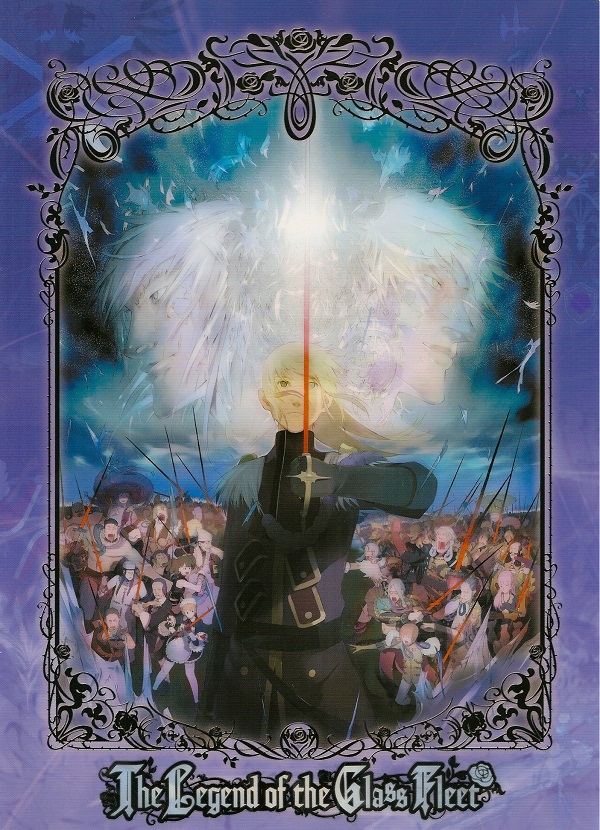 (https://mega.nz/#!Q3A32JIC!olEkl8O2BOh-LxVEhm3lPQETdYQ2vUWD36MXK4FW2H8)
(https://mega.nz/#!Q3A32JIC!olEkl8O2BOh-LxVEhm3lPQETdYQ2vUWD36MXK4FW2H8)
Sample (https://www.youtube.com/watch?v=BUXifvhTgD4)
Another reminder how phenomenal the 2000 anime era was, musicwise. It launched Kosuke Yamashita on the scene with arguably one of the best SciFi scores in the business. Recorded by a large studio orchestra and featuring an organ and a small choir, this is more a "Space Opera" than a simple SciFi/Fantasy adventure.
This is a remastering project to simulate a better recording environment resulting in hopefully better soundquality of the music. It now sounds like its recorded in a concert hall, making the sound more "big".
The score itself is regal, majestic and grand music full of Imperial Splendour with Shades of mysterious SciFi scoring and christian impressions. The score features a prominent Leitmotif, first heared in the track 3 "Cleo's Mundharmonica", its an omnious, tragic and powerful theme, heared in its full power in track 20 "Cleo, the Swift Wind". While there is a secondary theme, it unfortunately appears only thrice, opening up the score almost Overture-esque and sucking us into this majestic spaceworld with an uplifting and regal tone. A shame it isn't featured prominently in the score, which has its fair share of glorious adventurous fun, full of bold brassy action cues.
But it's piano rendition in track 24 "Michel's Love" is heartwearming.
The score also features a strong section of omnious, mysterious and dangerous SciFi toneworld, with my favorite moments appearing in track 28 "Planet Orleans", channeling Williams STAR WARS, complete with celeste.
It's unbelievable Yamashita was barely 30 when he wrote this. You have to understand, NOTHING in it feels traced or influenced from somewhere other than general standard repertoire. This score is completely made from his mind alone and told with his own unique voice. With this score alone he has cemented himself as one of the future greats. Seldom have I heared a better fusion of classical SciFi as done here. Later he would further develop his ability as a tunesmith but what never changed is his sixth sense for Leitmotif writing, giving this TV anime score a "film score" identity like many of his other works that is sadly a lacking trait by many other anime composers in the field.
As it stands, it's a beautiful and powerful SciFi score, one of the best in the genre, and I can't recommend it enough.
About the remastering: I will admit I'm perhaps overly ambitious this time but aside from a little more reverb from my side than ususal (wouldn't work otherwise) I hope this presents the score in better soundquality with more punch and "air", giving its regal character the adequate accoustic environment.
Ladies and gentlemen, I hope you find this satisfactory. I'm of course always open for criticism.
No excuse me, I have this urge to rewatch Chihayafuru ;)
New releases
UCHU SENTAI KYURANGER
TOKYO STUDIO ORCHESTRA AND CHOIR
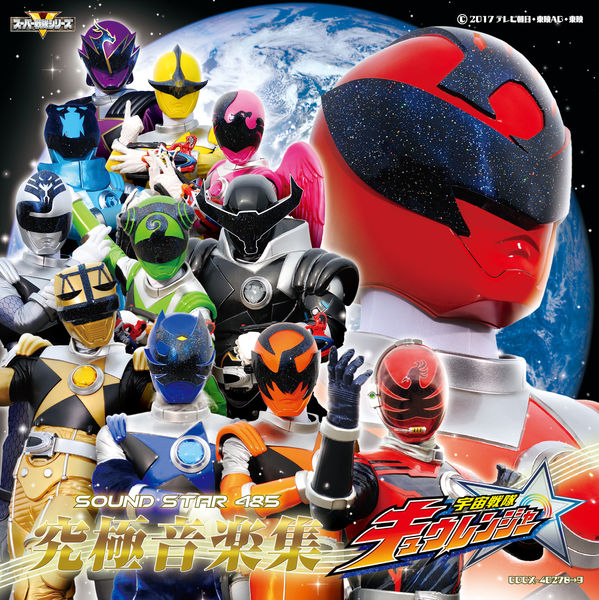
The Full Album (https://mega.nz/#!uFw2TC5B!FWtLqOBlUzlA0VFdCu_wclKa2hBAvv-xMXsUrTq2dE8)
The Orchestral Score (https://mega.nz/#!LApEWYbQ!Ji9bb9VQcoRhjQpa6pi1ucPDEDu8jXITgvZk2KbGqzA)
SAMPLE (http://picosong.com/wkHUz)
Badass! SciFi! Yamashita!
Two hours of smashing rock, Sahashi-esque funk and symphonic SciFi. Incredibly catchy themes, OPs and EDs as part of the score and his most catchy main theme since World Still Beautiful and my favorite of Yamashita's Sentai tetralogy (not for pure orchestra mind you). It has it all, Star Trek SciFi, Star Wars SciFi and pure 80s kickassery. The final climax is perhaps the greatest piece of genre-fusion I've ever heard in a Sentai score. But I'm having a hard time choosing either Magiranger, Gokaiger or Kyuranger as my favorite Sentai score of all time. Whether I'm in the mood for Fantasy, Swashbuckling Adventure or SciFi. They are all great fun.
Kosuke Yamashita

Kosuke Yamashita embodies the very principle of any great composer: Composition = Orchestration. The man is not even close to the age when Williams wrote the first STAR WARS and already demonstrates a genius at both disciplines that equals the Hollywood greats in their prime. Not to mention his melodic genius that produces killer theme after killer theme. Yamashita is also no stranger to collaborations. His genius at orchestration made him a prime candidate for Hisaishi to arrange his music for various occasions. To this day he is a sought after arranger for many orchestral projects and his reputations is equal to that of a great composer (lucky that he IS one as well). Considering his age that’s an enormous accomplishment. An interesting and rather saddening fact is that (like Jerry) he wrote his most accomplished work for obscurities (from anime to games) and only few people are even exposed to his genius. Still, he managed a nice successful career regardless, working in all fields of Japanese media and beyond. He currently works for a prestigious project that will hopefully put him on the radar of many directors and producers currently unaware of his gifts.
So let's dig in:
Part I – Universe (SciFi scores)

Yamashita wrote one of the best SciFi scores for the Anime medium with Glass Fleet, a highly energetic and thematic classical score that excels on all fronts. Almost every note is pitch-perfect. His mastery of orchestration at the age of 32 is just astounding. It’s an instant classic and certainly among the very best scores the anime medium has to offer: From the heroic theme A boldly soaring in “Michel” or the dramatic Theme B galloping in “Cleo of Swift Wind” to the playful and majestic “To the Flag of Freedom” and the innocent and romantic “Friendship”, it’s a great score and an incredible showcase of Yamashita’s genius.
Xenosaga: The Animation was in many ways a precursor to Glass Fleet. But this beast is much more “Hollywood” and rhythmic than the more classical Glass Fleet. It’s a perfect throwback to the glorious days of Hollywood ScFi. Yamashita also incorporates quite a bit of the game’s soundworld, meaning a healthy dose of synth pads and vocals. He also draws from his experience with Nobunaga’s Ambition and quite a few familiar moments appear.
Yamashita wrote perhaps the most mesmerizing epilogue for an Anime ever with Ozuma. He employs a full choir for the final reprise of his Main Theme and it evokes various kinds of overwhelming emotions, almost Mahler-esque. “Emergency sensor Barados” is a fantastic action show-off piece that brilliantly incorporates the Main Theme, with various orchestration stunts such as the use of organ. There’s a lot of chilling atmosphere in this one, accomplished by clever use of synth pads, organ, bells and esoteric flute. If you love experimental Jerry you will love “Ozuma and Arika”.
Dragonaut: A typical Japanese case of a ridiculous and silly SciFi-Anime getting a proper orchestral score. More contemporary than his other SciFi classics: Beats, E-Guitar and pounding synth bass, but all interwoven into a great orchestral voyage with a few peaks into the classical realm. Great usage of Leitmotif and thematic development. After Tanaka, here’s another composer who you can look up when you want to learn how to use an E-Guitar in an orchestral context AND what you can accomplish with a tiny ensemble.
Part II – Determination (Sport and Adventure scores)

Chihayafuru is perhaps his most uplifting and inspiring score. It has a fantastic theme, one of the very best he has written. It’s also used A LOT in the score. Thankfully Yamashita excels at Leitmotif writing so no problems there. For this sports drama he goes to various places, a full blown orchestral march, a beautiful romantic Love Theme and an incredible happy, bouncy and playful theme for the second season. A fair bit of synth pads and ethnic instruments are also present. But it’s really the drum kit that kicks things up a notch: One of the greatest examples of a drum kit easily doing almost the whole orchestral percussion part if you know what you are doing.
Another theme to die for is Soredemo Sekai wa Utsukushii (The World is Still Beautiful). A beautiful fantasy score that while it lacks proper action thanks to inadequate budget, still impresses thanks to its gorgeous theme and classical charm: beautiful waltzes, romantic love theme and serene song.
Shion no Ou ~ The Flowers of Hard Blood is a typical Japanese scoring practice. A seemingly mundane or ridiculous thing is scored like an epic film. You would not think it’s just music for a sports show. In this case it’s shogi. But Yamashita scores it like a great psychological love drama. Only the few uses of synth and beats give it away. Great score.
Yamashita ventures a little into Sentai territory with Digimon Xros Wars but not without a fair share of Hollywood pieces and yet another great theme. Quite a lot of delicious sax as well. Shame about the tiny budget though.
Part III – Ambition (Game scores)

Yamashita really started his career and became famous with Nobunaga’s Ambition, taking over after Yoko Kanno left. He pretty much became the series main composer with seven game score and an orchestra concert under his belt. They are all great and beautiful film scores and Yamashita pretty much scored all games like Hollywood movies, using almost every instrument ever used for film. They are very much uplifting and inspiring in nature, which makes sense considering you are encouraged to conquer the lands of Japan. My favorites are Nr. 4, for which he worked with the Czech Philharmonic, and Nr.7, again recorded with a big ensemble and some truly glorious moments that serve their purpose as a farewell from Yamashita to the franchise. Ever since the series stayed true to Yamashita’s legacy and stays Hollywood focused.
Part IV – Journey (Symphonic scores and collaborations)

Reign of Revolution is yet another masterpiece from Yamashita (for an obscure game) and another of the rare cases where he got his hands on a proper symphonic ensemble and choir. What amazing results! An epic fantasy adventure that would work just fine as a symphonic album. He also ventures occasionally into his Nobunaga soundworld. I’ve also included his Overture piece for good measure and because of similar spirit.
For Call of Chaos he almost lets the magic happen twice. Although not as substantial or cohesive as R2, it has many sublime moments and is more classical. Again working with a big ensemble.
On to his collaborations:
For Yamato Resurrection he did some great arrangements of Miyagawa’s iconic score. Guest appearance by Mahler. It’s all a precursor to the upcoming Yamato 2202, hopefully another Glass Fleet.
For the symphonic game album Orchestral SaGa –Legend of Music- he arranged the works of four composers to a grand symphonic journey. His orchestration skills and style shine so brilliantly here, that it might as well be his own symphonic work. He was also blessed with another symphonic ensemble: The FILMharmonic Orchestra of Prague. A mesmerizing work from start to finish. Scans by Leatherhead.
Hayabusa -The Long Voyage home- is for all intends and purposes a beautiful Hollywood SciFi score. A collaboration project of Nobuyuki Tsujii and Kosuke Yamashita where Yamashita did most of the heavy lifting. Also a sublime moment of Soprano Vocals.
Another collaboration where Yamashita overshadows his partner is Glass no Kamen. He arranged the heavy meat of Tamiya Terashima’s music into a beautiful, lyrical, majestic and romantic symphonic body. There’s just so much magic and spark in this one you have to hope that these two will collaborate again sometime in the future.
Casting Blossoms to the Sky is another beautiful and lyrical score and a special case where Yamashita arranged music from and composed together with the master (Hisaishi). There’s some stunningly beautiful moments in this gem.
Indivual pieces: For various game projects he arranged music that is not yet officially released but a few pieces are out there and they are just marvelous. Don’t miss the next SaGa: Scarlet Grace because Yamashita is arranging with a symphonic ensemble. For Konichiwa Anne he composed and arranged an insanely cute and heartwarming opening and his Wriggling Waltz is just stunning concert work.
Part V – Action (Tokusatsu scores)

Another brilliant side of Yamashita is his gift for energetic orchestral action with guitars, drum kits and synth pads. Nowhere shines this side brighter than in the scores he wrote for Super Sentai. Whether orchestral rides like Magiranger, proper symphonic adventures like Gokaiger or ridiculous fun like Ninninger, it’s all spectacle: Killer themes, upbeat action and glorious fanfares. For the numerous movie versions I combined certain scores I was not exactly happy with standalone. Space Sheriff Gavan (and Kamen Rider X Super Sentai if I remember correctly) is by Tangotreats.
Part VI – Romance (J-Drama scores)

You cannot exactly overcome the ideoms of the Japanese drama sound but within that soundworld Yamashita crafted some amazing scores.
Renai Neet is a lovely romantic score with another theme to die for, often played on soprano sax. Delightful marches, enchanting Jazz and beautiful romantic moments make this a joy to listen to. FLAC by nextday.
He wrote a similar delicate and beautiful score for Papa to Musume no Nanokakan (Father & Daughter). But I feel this one is even stronger in the romantic department and a bit more mature. There’s some genuine moments of grandeur as well.
Hana Yori Dango: He wrote some really great themes for this one, “Returns” in particular. More Hollywood than the usual drama and some sublime moments.
For Her husband he wrote perhaps his most joyful theme, with genius trumpet counterpoint. Runaway feels more like a Hollywood thriller and for Yamato Nadeshiko Shinchi Henge (The Wallflower) he goes nuts with orchestral grandour, pompous Jazz, frentic rock and pounding beats. Yukan Club finishes things with a mix of classic, baroque, Jazz and Rock.
Composer Profile: Kosuke Yamashita

Trademark: Orchestral Acrobat, Magic Drummer, Killer Tunesmith
Inspiration: Classical Repertoire, Hollywood Legacy, various 80s band work
Music Education: Tōkyō Geijutsu Daigaku, Piano Player, Songwriter
Occupation: Japanese Composer Arranger Association, University lecturer at Senzoku Gakuen College of Music
Worked with notable Orchestras: Czech Philharmonic, Kanagawa Philharmonic, FILMharmonic
Most known work: Super Sentai Magiranger & Gokaiger, Chihayafuru, Nobunaga's Ambition
Orchestral Skill-Level: Outstanding
Melodic Sense: Outstanding
Style: 80s Film Score, 80s Television, contemporary classic
LINK IN DESCRIPTION (https://mega.nz/#!xu4lHbpJ!8lmOTPDUXDVZAymU5yjCkQfAfVABGdHH0T4Y5wkoYH0)
---------- Post added at 08:15 AM ---------- Previous post was at 08:13 AM ----------
A closer look at one of his best scores:
The Legend of the Glass Fleet
Kosuke Yamashita
London Symphony Orchestra
 (https://mega.nz/#!Q3A32JIC!olEkl8O2BOh-LxVEhm3lPQETdYQ2vUWD36MXK4FW2H8)
(https://mega.nz/#!Q3A32JIC!olEkl8O2BOh-LxVEhm3lPQETdYQ2vUWD36MXK4FW2H8)Sample (https://www.youtube.com/watch?v=BUXifvhTgD4)
Another reminder how phenomenal the 2000 anime era was, musicwise. It launched Kosuke Yamashita on the scene with arguably one of the best SciFi scores in the business. Recorded by a large studio orchestra and featuring an organ and a small choir, this is more a "Space Opera" than a simple SciFi/Fantasy adventure.
This is a remastering project to simulate a better recording environment resulting in hopefully better soundquality of the music. It now sounds like its recorded in a concert hall, making the sound more "big".
The score itself is regal, majestic and grand music full of Imperial Splendour with Shades of mysterious SciFi scoring and christian impressions. The score features a prominent Leitmotif, first heared in the track 3 "Cleo's Mundharmonica", its an omnious, tragic and powerful theme, heared in its full power in track 20 "Cleo, the Swift Wind". While there is a secondary theme, it unfortunately appears only thrice, opening up the score almost Overture-esque and sucking us into this majestic spaceworld with an uplifting and regal tone. A shame it isn't featured prominently in the score, which has its fair share of glorious adventurous fun, full of bold brassy action cues.
But it's piano rendition in track 24 "Michel's Love" is heartwearming.
The score also features a strong section of omnious, mysterious and dangerous SciFi toneworld, with my favorite moments appearing in track 28 "Planet Orleans", channeling Williams STAR WARS, complete with celeste.
It's unbelievable Yamashita was barely 30 when he wrote this. You have to understand, NOTHING in it feels traced or influenced from somewhere other than general standard repertoire. This score is completely made from his mind alone and told with his own unique voice. With this score alone he has cemented himself as one of the future greats. Seldom have I heared a better fusion of classical SciFi as done here. Later he would further develop his ability as a tunesmith but what never changed is his sixth sense for Leitmotif writing, giving this TV anime score a "film score" identity like many of his other works that is sadly a lacking trait by many other anime composers in the field.
As it stands, it's a beautiful and powerful SciFi score, one of the best in the genre, and I can't recommend it enough.
About the remastering: I will admit I'm perhaps overly ambitious this time but aside from a little more reverb from my side than ususal (wouldn't work otherwise) I hope this presents the score in better soundquality with more punch and "air", giving its regal character the adequate accoustic environment.
Ladies and gentlemen, I hope you find this satisfactory. I'm of course always open for criticism.
No excuse me, I have this urge to rewatch Chihayafuru ;)
New releases
UCHU SENTAI KYURANGER
TOKYO STUDIO ORCHESTRA AND CHOIR

The Full Album (https://mega.nz/#!uFw2TC5B!FWtLqOBlUzlA0VFdCu_wclKa2hBAvv-xMXsUrTq2dE8)
The Orchestral Score (https://mega.nz/#!LApEWYbQ!Ji9bb9VQcoRhjQpa6pi1ucPDEDu8jXITgvZk2KbGqzA)
SAMPLE (http://picosong.com/wkHUz)
Badass! SciFi! Yamashita!
Two hours of smashing rock, Sahashi-esque funk and symphonic SciFi. Incredibly catchy themes, OPs and EDs as part of the score and his most catchy main theme since World Still Beautiful and my favorite of Yamashita's Sentai tetralogy (not for pure orchestra mind you). It has it all, Star Trek SciFi, Star Wars SciFi and pure 80s kickassery. The final climax is perhaps the greatest piece of genre-fusion I've ever heard in a Sentai score. But I'm having a hard time choosing either Magiranger, Gokaiger or Kyuranger as my favorite Sentai score of all time. Whether I'm in the mood for Fantasy, Swashbuckling Adventure or SciFi. They are all great fun.